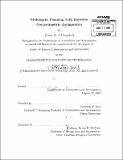| dc.contributor.advisor | Jonathan P. How. | en_US |
| dc.contributor.author | Campbell, Trevor D. J. (Trevor David Jan) | en_US |
| dc.contributor.other | Massachusetts Institute of Technology. Department of Aeronautics and Astronautics. | en_US |
| dc.date.accessioned | 2014-03-19T15:43:54Z | |
| dc.date.available | 2014-03-19T15:43:54Z | |
| dc.date.copyright | 2013 | en_US |
| dc.date.issued | 2013 | en_US |
| dc.identifier.uri | http://hdl.handle.net/1721.1/85766 | |
| dc.description | Thesis: S.M., Massachusetts Institute of Technology, Department of Aeronautics and Astronautics, 2013. | en_US |
| dc.description | Cataloged from PDF version of thesis. | en_US |
| dc.description | Includes bibliographical references (pages 95-105). | en_US |
| dc.description.abstract | Autonomous multiagent systems are beginning to see use in complex, changing environments that cannot be completely specified a priori. In order to be adaptive to these environments and avoid the fragility associated with making too many a priori assumptions, autonomous systems must incorporate some form of learning. However, learning techniques themselves often require structural assumptions to be made about the environment in which a system acts. Bayesian nonparametrics, on the other hand, possess structural flexibility beyond the capabilities of past parametric techniques commonly used in planning systems. This extra flexibility comes at the cost of increased computational cost, which has prevented the widespread use of Bayesian nonparametrics in realtime autonomous planning systems. This thesis provides a suite of algorithms for tractable, realtime, multiagent planning under uncertainty using Bayesian nonparametrics. The first contribution is a multiagent task allocation framework for tasks specified as Markov decision processes. This framework extends past work in multiagent allocation under uncertainty by allowing exact distribution propagation instead of sampling, and provides an analytic solution time/quality tradeoff for system designers. The second contribution is the Dynamic Means algorithm, a novel clustering method based upon Bayesian nonparametrics for realtime, lifelong learning on batch-sequential data containing temporally evolving clusters. The relationship with previous clustering models yields a modelling scheme that is as fast as typical classical clustering approaches while possessing the flexibility and representational power of Bayesian nonparametrics. The final contribution is Simultaneous Clustering on Representation Expansion (SCORE), which is a tractable model-based reinforcement learning algorithm for multimodel planning problems, and serves as a link between the aforementioned task allocation framework and the Dynamic Means algorithm | en_US |
| dc.description.statementofresponsibility | by Trevor D. J. Campbell. | en_US |
| dc.format.extent | 105 pages | en_US |
| dc.language.iso | eng | en_US |
| dc.publisher | Massachusetts Institute of Technology | en_US |
| dc.rights | M.I.T. theses are protected by copyright. They may be viewed from this source for any purpose, but reproduction or distribution in any format is prohibited without written permission. See provided URL for inquiries about permission. | en_US |
| dc.rights.uri | http://dspace.mit.edu/handle/1721.1/7582 | en_US |
| dc.subject | Aeronautics and Astronautics. | en_US |
| dc.title | Multiagent planning with Bayesian nonparametric asymptotics | en_US |
| dc.type | Thesis | en_US |
| dc.description.degree | S.M. | en_US |
| dc.contributor.department | Massachusetts Institute of Technology. Department of Aeronautics and Astronautics | |
| dc.identifier.oclc | 871257939 | en_US |
